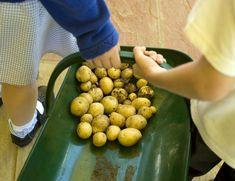
Children’s understanding and experience of food issues is getting better but secondary-age kids are not cooking as often as they used to and their involvement and interest is declining, according to research recently carried out among some 2,500 schoolchildren.
The study 'Benchmarking the views of children on food, farming and countryside issues' was commissioned by the Agriculture & Horticulture Development Board which was the primary funder and carried out by charity Farming & Countryside Education in England, Scotland and Wales. Children aged seven to 15 were asked about their attitudes to various aspects of food, farming and the countryside. Some 65 schools completed online questionnaires and there were 11 discussion groups. The research covered children from urban, suburban and rural areas with varying abilities and backgrounds. It found that eight out of 10 primary-age children were involved with growing food at home, at school or with friends and relations.
This compares favourably with findings in a similar survey in 2007-8 that found only five out of 10 children were involved in growing. The figures for secondary schoolchildren were six out of 10 this year compared to four out of 10 in 2007-8.
When asked about their attitudes to different foods, most children had an understanding of what constituted a healthy diet, and how to use labelling to help them choose. Typically, children of all ages claimed they were trying to eat foods such as fruit and vegetables, and cut back on crisps and salt.
When the survey asked about cooking at home, 79 per cent of children aged seven to 11 said they had cooked at home, with 32 per cent doing so once a week. The children described making snacks and sandwiches and helping parents prepare meals as experiences of cooking at home, alongside more traditional activities such as baking cakes.
However, although a third of 11 to 15-year-olds said they cooked independently using either fresh or store-cupboard ingredients, the research highlighted that the number of this age group not cooking has doubled and their involvement and interest in cooking regularly is decreasing compared to five years ago.



